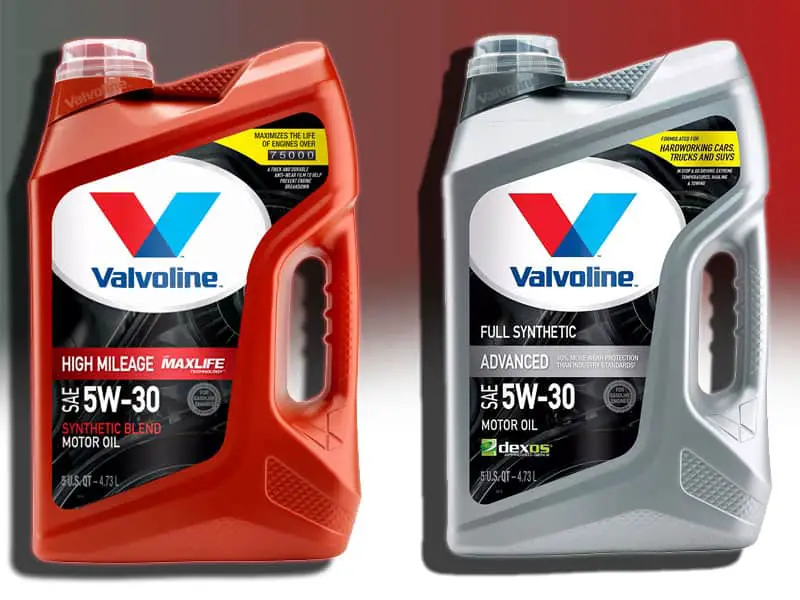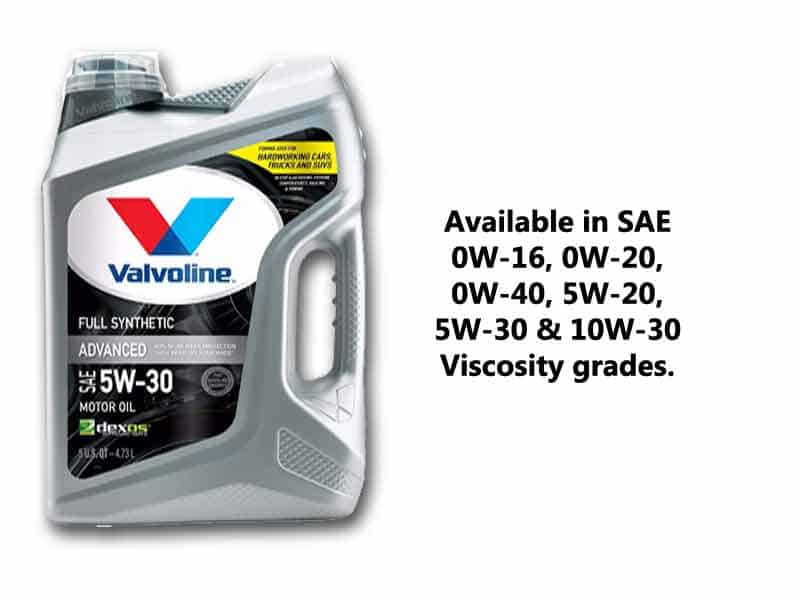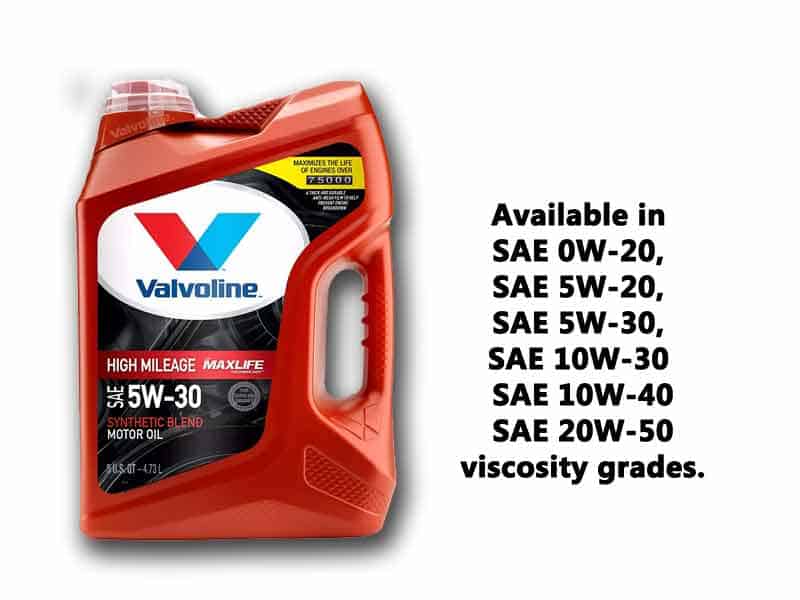Both of these are full synthetic motor oils made from the mixture of group III and group IV base oils with High Mileage having more additives being added into it. Both of them are used in gasoline engines.
Advanced is mostly used in trucks, hardworking cars and Vehicles used in resilient conditions. It is ideal engine oil for high temperature conditions since it protects engine from severe wear and tear in harsh conditions.

Compare Valvoline Advanced with Pennzoil Full Synthetic Oil
Furthermore, its mobility in cold condition is also phenomenal. With elite anti-wear additives and antioxidants, this motor oil ensures engine’s safety and longevity.

On the other hand, High Mileage is used for engine with above 75,000 mileage.
It contains more additives and they enhance engine performance while preventing internal and external leakage.
Its anti-wear capability is slightly better than its competitor, and it also has the upper hand when it comes to fuel economy.
But lacks behind in the harsh weather conditions when compared to Advanced oil.

| Specifications | Valvoline Advanced | Valvoline High Mileage |
| Type | Synthetic | Synthetic |
| Engine supported | Gasoline | Gasoline |
| Available Viscosity Grades | SAE 0W – 16, 0W – 20, 0W – 40, 5W – 20, 10W – 30, 5W – 30 | SAE 0W – 20, 5W – 20, , 10W – 305W – 30 |
| ILSAC | GF-6A | GF-6A |
| API | SP | SP |
| Cost | 21.83$ for 5 quartzes (SAE 5W – 30) | 22.47$ for 5 quartz SAE 5W – 30 |
| Oil change frequency | 5,000 – 10,000 miles | 5,000 – 10,000 miles |
| Additives | Anti-wear Additives, Engine cleaning agents, Superior Antioxidants | Friction-fighting Agents, Enhanced wear additives, Interior-cleansing Detergents, Premium Seal Conditioners |
| ACEA | A5/B5 | A5/B5 |
Table of Contents
Catalytic Converter
Zinc in a compound form, either in zinc dialkyldithiophosphate (ZDDP) or zinc dithiophosphate (ZDTP), is present in almost all engine oils as an anti-wear additive.
During combustion, small quantity of engine oil also gets burned so the zinc and phosphorous particles change into ash and have negative affect on converter as it gets blocked. The phosphorous and zinc content in Valvoline Advanced is 760 ppm and 830 ppm respectively.
While, the content of phosphorous & zinc in High Mileage is 770 ppm and 850 ppm, slightly more than Advanced. So, in this regard, Advanced motor oil is better and safer option than its counterpart.
Sludge build-up
When engine oil comes in contact with oxygen at high temperature (above 60o C), the process of oxidation occurs which results in the formation of sludge, deposit and varnish. That’s why cleaning detergents are being combined with motor oils in order to provide better deposit and sludge protection.
Cleaning detergents are usually made of compounds of magnesium, sodium and calcium phenolates. The quantity of calcium, magnesium and sodium in Valvoline Advanced is 1426 ppm, 496 and less than 5 ppm respectively and in High Mileage it is 1370 ppm, 626 ppm and 7 ppm.
By analyzing the content of three main components of the cleaning detergent in both of these oils, we can conclude that the sludge removing ability of both motor oils is almost competitive, 25 % better than industry standards.
Oil Burning shield
Evaporation of engine oil due to high temperature condition of the engine is normal. It is inevitable to avoid, the engine oil does get burn at some point but which engine oil has the tendency to burn off quickly depends upon its flash point.
Flash point is the minimum temperature at which vapors of a liquid catches fire if an ignition source is provided. Flash point of Valvoline Advanced is 220oC and of Valvoline High Mileage is 199oC.
Even though High Mileage is known for its seal protection and prevention of leakage in the engine, if it gets into the situation of burning up, it would burn off quicker than its competitor. Hence, when it comes to oil burn-off protection Advanced has the upper hand.
Diminishing Wear-Off
Engine wear off occurs due to over-heating, low level of engine oil and improper vehicle operations. Anti-wear additive is being added into engine oils in order to minimize the metal-to-metal contact between engines moving parts.
And anti-wear additive does that by creating a film between moving metals while promoting their smooth movement.
Zinc dialkyldithiophosphate (ZDDP) is one of the most popular anti-wear additives.
Both oils have this anti-wear additive in them but, as mentioned above, the quantity of zinc and phosphorous in High Mileage is more than Valvoline Advanced, providing approximately 10 % more wear protection than its contender.
Viscosity Comparison
Advanced is available in six multi-grade viscosities and High Mileage is available in four multi-grade viscosities, all of them have been introduced in the table above. But these numbers do not represent kinematic viscosity values but rather their grades. On absolute scale, Valvoline Advanced viscosity is slightly higher than its counterpart. For example, the viscosity of Advanced SAE 5W – 30 at 40oC and 100oC is 61 and 10.5 centistokes respectively. On the other hand, viscosity of High Mileage, at the same temperatures and of the same grade, is 60 and 10.7 centistokes respectively.
Another important parameter to look upon while comparing viscosities is viscosity index, tendency of a lubricant to change its viscosity due to change in temperature. The viscosity index of Advanced 5W – 30 and High Mileage 5W – 30 is 162 and 170. The propensity of viscosity change due to change in temperature in Valvoline High Mileage is slightly more than its contestant.
Pour point, the lowest temperature below which the liquid loses its flowing ability, is also another important parameter to consider here. The pour point of both Advanced and Valvoline High Mileage is (-36o C) which makes both reliable in cold weather.
Comparing Oil Change Rate
Many types of acids get produced, as a by-product, in an engine during combustion and other reactions like oxidation. And these acids are harmful for both the engine components and for the lubricant. That’s why alkaline bases are being added into engine oil to neutralize the acids. Total base number of any oil determine its ability to neutralize acids. Oil changing frequency depends upon the TBN of any engine oil. So, the engine oil with more TBN would be able to neutralize acids for longer period of time than the one with less. The TBN of Valvoline Advanced and High Mileage is 8.1 and 7.8 mg KOH/g. Hence the oil changing frequency of Advanced is than the other one.
Cost Comparison
Valvoline Advanced SAE 5W-30 5 QT costs $21.83 while Valvoline High Mileage SAE 5W-30 5 QT is priced at $22.47. High Mileage is comparatively expensive than the other one due to its better wear protection and fuel economy.
Summary
Advanced is a full synthetic engine oil designed to protect engines of hard-working cars in resilient environment. It comes in wide variety of viscosity grade and can provide crucial protection to your engine due to anti-wear additive, superior anti-oxidants and extra engine-cleaning detergent. But the major reason for utilizing it is its ability to protect an engine in extreme conditions which gives it the edge over most engine oils including High Mileage.
Valvoline High Mileage is a full synthetic engine oil with MaxLife Technology which is designed with ingenuity to provide ultimate protection for the engines having more than 75000 miles in their odometers. Like its competitor, it also protects engine due to having anti-wear additive, anti-oxidants and cleaning detergents in it. But it is known for its premium seal protection ability which prolongs the life of the engine by preventing leaks and stopping seals aging process.